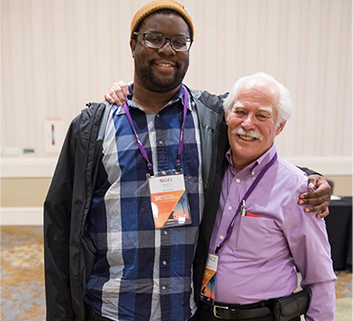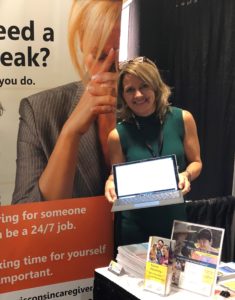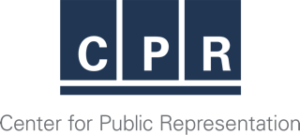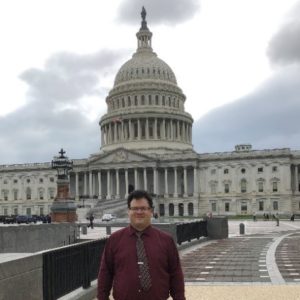Workers Speak Out on Disability and Health: New Report on Paid Family Leave and the Disability Angle
Today, The Arc of the United States (The Arc) and the National Center for Children in Poverty (NCCP) at Columbia University’s Mailman School of Public Health are releasing Disability Perspectives on Paid Leave: A Qualitative Analysis of Leave-taking Among Workers Affected by Disabilities or Serious Health Conditions. This ground-breaking research examines how workers with disabilities and working caregivers of people with disabilities use, need, and benefit from paid family and medical leave. It is one of the only studies to specifically explore whether current paid and unpaid leave policies and programs for working individuals meet the needs of the disability community. Findings offer key insights on how existing leave policies can become more inclusive to this historically under-served group, and highlight the need for a comprehensive, national paid leave policy.
Researchers at NCCP conducted and analyzed in-depth interviews with 90 workers with disabilities and working caregivers in California, New Jersey, New York, and North Carolina. Major findings include:
- Workers with disabilities and working caregivers take leave for diverse and often disability-specific reasons.
- Workers want to maximize their time at work and benefit when they can use paid leave in conjunction with other employment benefits.
- Workers highly value the Family and Medical Leave Act (FMLA) and state-administered paid leave options, which in this study included programs in California, New Jersey, and New York.
- Multiple barriers and gaps limit workers’ access to leave, including fear of job loss and stigma against disabilities. In states with paid family and medical leave insurance, certain program features also limit access, including low awareness and understanding of the program, inadequate wage replacement, narrow or unclear covered reasons for leave, and inadequate coverage for self-employed and public workers.
Based on these findings, the paper provides recommendations for how policymakers, employers, and advocates can make it easier for all workers to take leave from work during a stressful period of their lives. Most importantly, the findings provide a road map for an inclusive national paid leave policy.
“Our goal with this paper is not only to inform, but also to expand the national dialogue to make paid leave policies and proposals stronger and more inclusive. As this study’s findings show, paid leave is extremely important for people with disabilities and their families, including people with intellectual and developmental disabilities. At The Arc, we believe that our nation can and should put in place an inclusive, comprehensive national paid leave policy that reflects the full range of workers’ leave needs, including people with disabilities and their families. We hope this paper provides the blueprint leaders need to advance this process,” said T.J. Sutcliffe, Senior Director, Income & Housing Policy, The Arc.
The need for paid family and medical leave is universal – nearly all of us will need paid leave at some point to care for a family member, address our own serious medical condition, or welcome a new child into our family. The disability perspective, however, has often been missing from the national conversations and research on paid leave, despite the fact that roughly 1 in 5 Americans has a disability. As such, there is a huge gap in understanding on how the disability community uses paid leave, the frequency of use of this benefit, and whether current federal and state policy frameworks and available paid leave programs meet the disability community’s needs.
“It is crucial to hear from working individuals directly affected by serious health conditions and disability to understand how paid leave policies can work better for them. Our in-depth conversations with workers revealed important patterns and policy considerations that deserve more discussion, such as the need for an inclusive definition of family and flexibility to take leave for myriad reasons. This study bolsters current survey research on disability and paid leave by contributing the lived experiences of working individuals,” said Dr. Heather Koball, Director of NCCP.
About the Study: This qualitative study aimed to (1) understand common usage patterns of unpaid and paid leave programs, (2) to assess the priorities of working caregivers and workers with disabilities regarding taking leave from work, and (3) pinpoint ways in which key stakeholders can better support this population of workers. The research team asked participants their reasons for taking leave and about their leave-taking patterns, as well as what factors influence their access to specific leave benefits.
The National Center for Children in Poverty (NCCP) is a non-partisan public policy research center at Columbia University’s Mailman School of Public Health. Founded in 1989 with endowments from the Carnegie Corporation of New York and the Ford Foundation, NCCP is dedicated to promoting the economic security, healthy development, and well-being of America’s low-income children and families. Using research to inform policy and practice, the center seeks to advance family-oriented solutions and strategic use of public resources at the state and national levels to produce positive outcomes for the next generation.




 Each November, we observe National Caregiver Month – honoring those who devote their lives to providing care for individuals with intellectual and developmental disabilities.
Each November, we observe National Caregiver Month – honoring those who devote their lives to providing care for individuals with intellectual and developmental disabilities. 

 The Arc of Loudoun and its Executive Director Lisa Kimball sure do know how to get in the Halloween spirit.
The Arc of Loudoun and its Executive Director Lisa Kimball sure do know how to get in the Halloween spirit. During August Recess, Members of Congress return to their home states to meet with their constituents. It’s the perfect time for advocates to meet with legislators and tell them #HandsOff important programs – like Medicaid, Supplemental Security Income (SSI), Supplemental Nutrition Assistance Program (SNAP) and much more.
During August Recess, Members of Congress return to their home states to meet with their constituents. It’s the perfect time for advocates to meet with legislators and tell them #HandsOff important programs – like Medicaid, Supplemental Security Income (SSI), Supplemental Nutrition Assistance Program (SNAP) and much more.





